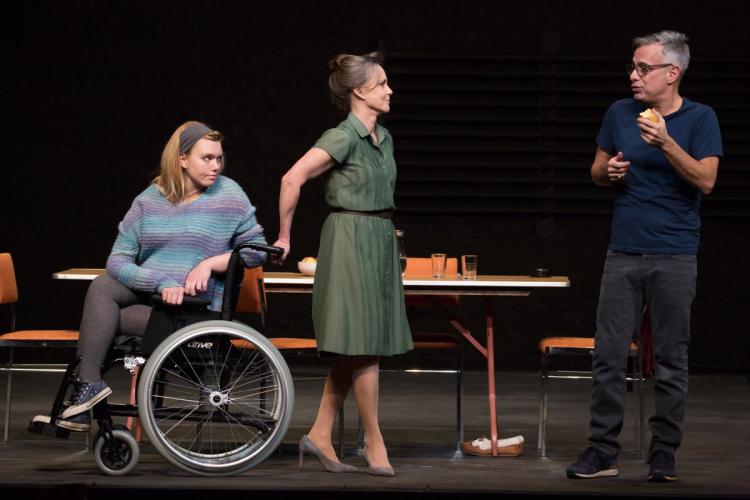
This is not your parents' Glass Menagerie.
It's not uncommon for theatrical "reinventions" to take place nowadays. Ivo van Howe has made it into a cottage industry of sorts, creating an intimate, visceral A View From the Bridge and a raw, elemental The Crucible in recent years. Sam Gold is of the same cloth. He made his name with an audacious revival of Look Back in Anger at the Roudabout in 2012, won the Tony in 2015 for his sensitive in-the-round staging of the musical Fun Home, and most recently directed a searing Othello with David Oyelowo and Daniel Craig off Broadway at the New York Theater Workshop.
But all those pieces benefit from a stripped back, in-some-cases radical rethinking. Tennessee Williams's memory play is a much more delicate thing, announcing as narrator Tom Wingfield does right at the start that this is a subjective work of art, a piece of memory that may or may not represent what actually happened. Productions of it generally take after the play's quietest character, the "crippled" Laura - they are generally fragile, gossamer things, as light and airy as a thought or memory hanging in the air in front of us...
This Glass Menagerie is much different. It is heavy and world-weary, feet firmly planted on the ground. But is it a bold feat of reclaiming these characters from memory and turning them into flesh-and-blood human beings? Or is it effectively a different play entirely?

I wrestled with this question all the way through this production. I am certain, though, that the performances are absolutely tremendous. Joe Mantello makes for an angrier, more capricious Tom, but in so doing gets at the subtext of the character's gayness better than most. Madison Ferris makes a stunning Broadway debut as Laura, grounding her far more than most other actresses have done. Finn Wittrock is charming, All-American perfection as the Gentleman Caller. And in the showcase role of faded Southern belle (is there any other kind in the world of Williams?) Amanda, Sally Field returns to the stage in stunning form.
Field has already played Amanda, at the Kennedy Center in 2004, but here she is completely in tune with what her new director and castmates are doing, playing a much more alive, much more fiery Amanda than we usually get to see. Field is perfectly attuned to the setting, too - both to the theater and the stage, which is bare but for a table with chairs, and a Victrola with Laura's records and glass animals. A stage so empty needs to be filled, and Field is just the actress to do it, serving up personality plus whenever she's in a scene. Magically, though, it doesn't feel like a BIG performance. Field dials back enough in moments to make sure Amanda stays real, not just the sum of her stories and put-upon airs. This is a mother who cares deeply about her children, who wants them to have what she had, and regrets losing. It is a performance of stunning power in both the tiniest and grandest of gestures.
But the production hinges on the choice to cast Ferris, who has muscular dystrophy, as Laura. In the play, Laura has a slight limp, but what really cripples her is her fear that everyone notices and judges her for it. She has taken her small defect and magnified it so that she sees herself as defective and unfit for the world that other people live in, withdrawing into a world of her own. But in this production, she is really, visibly disabled, having to walk on all fours in order to get into and out of her wheelchair. That she manages to get to business school - or even just walk around all day to make her mother think she's going - is a small miracle. Ferris's Laura comes off as surprisingly grounded, someone who could get along just fine in the world... if only she were "normal".
This is not the Laura that Williams wrote, but rather a girl whose physical disability has caused her to lose almost all confidence in herself outside of the safe space she has created for herself. The scene between Laura and the Gentleman Caller, made all the more magical in Gold's vision for being lit solely by the flames of a candelabra, is even more heart-rending for how honestly he does not see her disability and convinces her to not see it, too.

So no, this is not quite the play that Tennessee Williams wrote back in the 1940s. But it is still quite rich with feeling, and in a few instances beautifully staged. Sam Gold and his cast have put a light to this piece of glass, causing it to shine with all sorts of colors we never quite knew it had. This may not be the Glass Menagerie you know, but that doesn't mean it's not worthwhile.